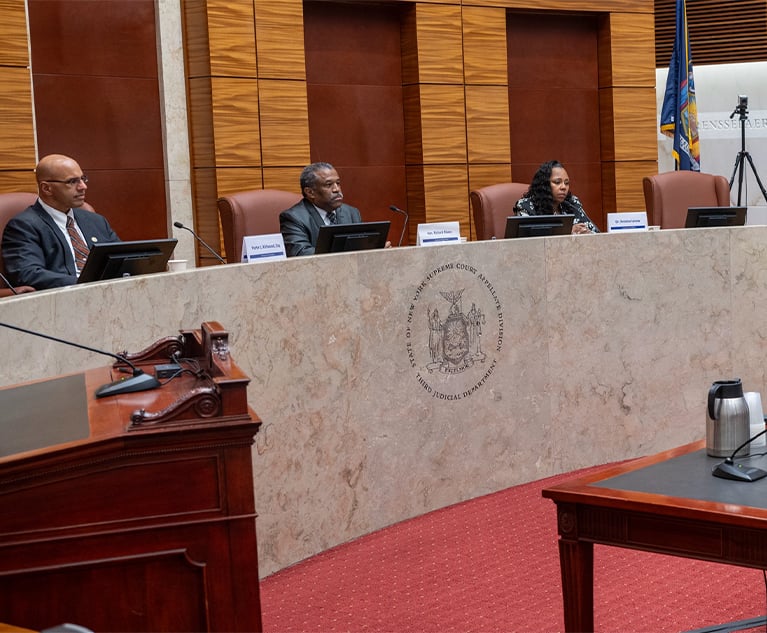Citing Risk of 'Arbitrary and Discriminatory Enforcement,' Federal Judge Finds Gravity Knife Ban Unconstitutionally Vague
U.S. District Judge Paul Crotty said the state law, passed in the 1950s, was too vague in its application by the NYPD and the Manhattan DA's office for the plaintiff to determine whether he was within the bounds of the law.
March 28, 2019 at 02:51 PM
7 minute read
 (Courtesy photo)
(Courtesy photo)
The application of New York State's law banning so-called gravity knives by the office of Manhattan District Attorney Cyrus Vance Jr. was found unconstitutionally vague by a federal judge in Manhattan, who said in an opinion enjoining the statute that it presented “a high risk of arbitrary and discriminatory enforcement.”
Senior Judge Paul Crotty of the U.S. District Court for the Southern District of New York said the statute failed to provide both clarity for an individual to know whether the knife she sought to carry was, in fact, a gravity knife. This vagueness allowed police and prosecutors far too much discretion in prosecuting gravity knife cases in a manner Crotty called unclear and inconsistent.
“Criminal culpability here is tied to a vague definition and functional test that could have outcomes depending on who is performing it and when,” the judge wrote.
Crotty's opinion represents a significant win for opponents of the ban, after facing both legal and legislative setbacks in changing the 1950s-era law. An earlier challenge to the law was defeated on appeal in 2018 to the U.S. Court of Appeals for the Second Circuit after the appellate panel affirmed the district court's finding that the plaintiffs failed to show the statute was unconstitutionally vague as-applied to the facts of the case, or on its face.
State legislators attempted to address the law in 2016, changing the law to be more clear on exactly what type of knife was meant to be banned. Gov. Andrew Cuomo went on to veto the amendment, claiming at the time that it would create more confusion among law enforcement.
The current suit was filed by Joseph Cracco, a sous chef who used a folding knife to open boxes and other items at his job. He was stopped in October 2013 by a New York City police officer while commuting home on the subway. An officer applied a so-called wrist-flick test, in an attempt to show the knife can be opened without manually doing so.
Cracco claimed it took the officer four or five times before succeeding in flicking open his knife, requiring ever-increased force to do so. The officer disputed this claim. Cracco ultimately pleaded to a disorderly conduct charge on the gravity knife charge.
In 2014, Cracco filed an initial complaint in federal court over the complaint, which was stayed while the legislative and legal processes played out. In September 2018, the district court took up the case again, with both Cracco and the city filing for summary judgment.
In his decision, Crotty noted that Cracco's challenge was an as-applied one based on the circumstances of his prosecution, that it took anywhere from one to five flicks to open and that he wishes to possess the same type of knife, but fears he may be prosecuted again. He was, therefore, seeking prospective relief to allow him to better determine whether the knife is a legal one.
As Crotty noted, the Second Circuit's decision in Copeland v. Vance to uphold the dismissal of the prior challenge after applying the facial vagueness standard still explicitly left open the possibility that a true prospective, as-applied vagueness standard could possibly succeed.
“While the district attorney disputes that it took many attempts, Cracco did not posit hypothetical unfair enforcement actions, but rather used his own criminal prosecution as the basis for this challenge,” Crotty wrote.
The judge found that even the requested relief that would limit attempts of the wrist-flick test to two maximum was “not a perfect solution,” as Cracco could still not be able to determine if any given knife would pass that test as applied by any given officer.
The DA's office argued this remedy would apply to other people beyond Cracco, and that the court should view it as a facial challenge similar to the suit that failed at the Second Circuit. Crotty found that a solution applying to others as well as Cracco didn't automatically transform the nature of the challenge.
The DA's office went on to argue that the statute and prior prosecutions were enough to put Cracco on proper notice about the potential illegality of the knife he possessed. Yet the office does not claim any folding knife is a gravity knife. Only the application of the test, which has no criteria other than it did or didn't open eventually, can make that determination. As such, Cracco had “no way of knowing that his past conduct was, or that his intended future conduct will be, criminal” under the law, Crotty found.
The district court noted that there is, contrary to the DA's claims, no clear case law in New York on what can be considered a gravity knife that Cracco could rely on. Knives that prosecutors have brought cases on are regularly sold in the state, making it more confusing. Even the stated purpose of the statute itself in getting dangerous knives out of the hands of those committing crimes “supports the conclusion that the statute is vague,” Crotty found.
“The statute was not intended to criminalize the possession of the type of ordinary folding knife that Cracco possessed, which are commonly used by cooks, craftsmen and laborers to perform their job functions; it was intended to criminalize knives used by criminals in New York City,” the judge wrote.
That Vance's office said it would be unlikely to prosecute a case where it took four or five flicks for a knife to open, but that it had the authority to do so and it should be up to a jury to make the ultimate call were not “sufficiently clear standards that eliminate the risk of arbitrary enforcement,” Crotty found.
“Under the gravity knife statute and the procedures used to enforce it, there is indeterminacy regarding what a gravity knife actually is. Is it a folding knife that opens and locks into place on the first try? The second? Any number of tries? The gravity knife statute and the wrist flick test do not allow Cracco to discern whether his intended conduct will be criminally prohibited,” the judge wrote. “The gravity knife statute presents a high risk of arbitrary and discriminatory enforcement in the context of Cracco's challenge.”
A spokesman for Vance's office, Danny Frost, said the DA's office was reviewing the decision.
Cracco was represented by attorney James Maloney, who did not immediately respond to a request for comment.
Legal Aid Society attorney Martin LaFalce, who was one of the amicus counsel for the organization in the Copeland case, said Crotty's ruling recognized “the core argument” that plaintiffs have been making for years, “that the NYPD and DA office's enforcement of the gravity knife statute leaves thousands of New Yorkers guessing.”
“NYPD and the Manhattan DA's Office exploit the law's amorphous standard to bludgeon thousands of our clients.,” he said.
LaFalce said he anticipated Crotty's decision to reach the Second Circuit on appeal, leaving the effect of the vagueness finding up in the air. In Albany, there continues to be a push to change the law to finally address the issue, according to Assemblyman Dan Quart of Manhattan.
Quart, who authored the previous version of the bill amending the gravity knife statute in the Assembly, said that, despite Crotty's decision, “as of right now,” changes to the state law are still necessary.
“From my perspective, the bill is completely consistent with what Judge Crotty said and would remove the term from the statute, which is appropriate.”
Dan M. Clark contributed to this story.
Related:
Foes of 'Gravity Knife' Ban Ask for SCOTUS Review on Vagueness Grounds
This content has been archived. It is available through our partners, LexisNexis® and Bloomberg Law.
To view this content, please continue to their sites.
Not a Lexis Subscriber?
Subscribe Now
Not a Bloomberg Law Subscriber?
Subscribe Now
NOT FOR REPRINT
© 2025 ALM Global, LLC, All Rights Reserved. Request academic re-use from www.copyright.com. All other uses, submit a request to [email protected]. For more information visit Asset & Logo Licensing.
You Might Like
View All

Law Firms Expand Scope of Immigration Expertise Amid Blitz of Trump Orders
6 minute read
'Reluctant to Trust'?: NY Courts Continue to Grapple With Complexities of Jury Diversity
Trending Stories
- 1Uber Files RICO Suit Against Plaintiff-Side Firms Alleging Fraudulent Injury Claims
- 2The Law Firm Disrupted: Scrutinizing the Elephant More Than the Mouse
- 3Inherent Diminished Value Damages Unavailable to 3rd-Party Claimants, Court Says
- 4Pa. Defense Firm Sued by Client Over Ex-Eagles Player's $43.5M Med Mal Win
- 5Losses Mount at Morris Manning, but Departing Ex-Chair Stays Bullish About His Old Firm's Future
Who Got The Work
J. Brugh Lower of Gibbons has entered an appearance for industrial equipment supplier Devco Corporation in a pending trademark infringement lawsuit. The suit, accusing the defendant of selling knock-off Graco products, was filed Dec. 18 in New Jersey District Court by Rivkin Radler on behalf of Graco Inc. and Graco Minnesota. The case, assigned to U.S. District Judge Zahid N. Quraishi, is 3:24-cv-11294, Graco Inc. et al v. Devco Corporation.
Who Got The Work
Rebecca Maller-Stein and Kent A. Yalowitz of Arnold & Porter Kaye Scholer have entered their appearances for Hanaco Venture Capital and its executives, Lior Prosor and David Frankel, in a pending securities lawsuit. The action, filed on Dec. 24 in New York Southern District Court by Zell, Aron & Co. on behalf of Goldeneye Advisors, accuses the defendants of negligently and fraudulently managing the plaintiff's $1 million investment. The case, assigned to U.S. District Judge Vernon S. Broderick, is 1:24-cv-09918, Goldeneye Advisors, LLC v. Hanaco Venture Capital, Ltd. et al.
Who Got The Work
Attorneys from A&O Shearman has stepped in as defense counsel for Toronto-Dominion Bank and other defendants in a pending securities class action. The suit, filed Dec. 11 in New York Southern District Court by Bleichmar Fonti & Auld, accuses the defendants of concealing the bank's 'pervasive' deficiencies in regards to its compliance with the Bank Secrecy Act and the quality of its anti-money laundering controls. The case, assigned to U.S. District Judge Arun Subramanian, is 1:24-cv-09445, Gonzalez v. The Toronto-Dominion Bank et al.
Who Got The Work
Crown Castle International, a Pennsylvania company providing shared communications infrastructure, has turned to Luke D. Wolf of Gordon Rees Scully Mansukhani to fend off a pending breach-of-contract lawsuit. The court action, filed Nov. 25 in Michigan Eastern District Court by Hooper Hathaway PC on behalf of The Town Residences LLC, accuses Crown Castle of failing to transfer approximately $30,000 in utility payments from T-Mobile in breach of a roof-top lease and assignment agreement. The case, assigned to U.S. District Judge Susan K. Declercq, is 2:24-cv-13131, The Town Residences LLC v. T-Mobile US, Inc. et al.
Who Got The Work
Wilfred P. Coronato and Daniel M. Schwartz of McCarter & English have stepped in as defense counsel to Electrolux Home Products Inc. in a pending product liability lawsuit. The court action, filed Nov. 26 in New York Eastern District Court by Poulos Lopiccolo PC and Nagel Rice LLP on behalf of David Stern, alleges that the defendant's refrigerators’ drawers and shelving repeatedly break and fall apart within months after purchase. The case, assigned to U.S. District Judge Joan M. Azrack, is 2:24-cv-08204, Stern v. Electrolux Home Products, Inc.
Featured Firms
Law Offices of Gary Martin Hays & Associates, P.C.
(470) 294-1674
Law Offices of Mark E. Salomone
(857) 444-6468
Smith & Hassler
(713) 739-1250







